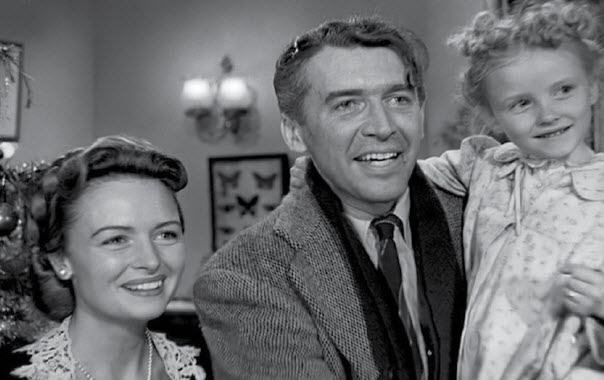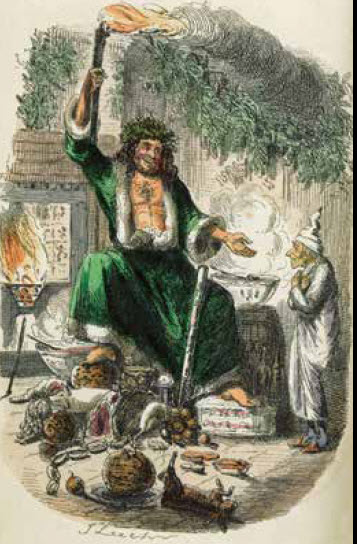It’s A Wonderful Christmas Carol
 By: Rosemary Dewar
By: Rosemary Dewar
During the Christmas season, two of the most recognized stories have been Charles Dickens’ A Christmas Carol and Frank Capra’s It’s A Wonderful Life. An amazing parallel was revealed to me by award-winning author Andrew Klavan. On two separate occasions he demonstrated that these two stories are perfect mirrors of one another. I became so fascinated by the observation that I think you would appreciate it as well. Ebenezer Scrooge and George Bailey could not be more diametrically opposed at the beginning of their stories. However, both characters are fated to learn the same lesson, and are both redeemed by them. Life, and the love for it, will save the most damned or heavy-hearted of souls.

We are introduced to Ebenezer Scrooge, who is as an educated, elderly, wealthy bachelor. He is fundamentally disliked by his community and family, but many show pity on him in the hopes of being benefitted by his charity; but to no avail. Ebenezer is a money-lender that is so parsimonious that his clients become destitute, and his only clerk practically suffers from hypothermia every winter under his employment. Ebenezer is content to live and die near to where he resides, and doesn’t seem to mind what others think of him. George Bailey, in contrast, is a young lad that hopes to travel everywhere and learn everything in order to become an architect. George’s life quickly changes as the death of his father directs him to take over the family’s lending business. As he stays in his hometown, George gets married and has four children.
One fateful night comes to both men on the heels of Christmas. Ebenezer Scrooge is visited by the tormented spirit of his old business partner, Jacob Marley. He is warned that if he continues to live out his days in the state he is in, he will end up in the same torturous peril Jacob is in now. Marley foretells the arrival of three more spirits that will visit him in order to possibly save him from the same misfortune. As for George Bailey, he is faced with the threat of losing the family business. In a moment of desperation, George meets with his dreaded competitor, Mr. Potter. Potter is so heartless that he tells George that his life insurance policy makes him more valuable dead than alive. Depressed and raw, George goes home and projects his frustration on his family, is filled with guilt, and drives to the nearest bar. After getting thrown out, he crashes his car in to a bridge, and contemplates ending his misery right then and there. An angel, Clarence, visits him by jumping in first, and George saves him instead. As they commiserate, George wishes he had never been born, and Clarence grants his wish.
Ebenezer and George are taken on a journey through the past, present, and future in the reality of their choices. Ebenezer sees his childhood that is lonely except for the warmth of his sister, Fannie. He then sees the time he first met his fiancée, Belle, but re-experiences her release of his commitment to her after he postpones their union yet again. In the present, Ebenezer witnesses his only nephew and employee pry a blessing for Ebenezer out of their guests and family members. As Ebenezer peers into the future, he sees that he is dead, and there is not a kind word shared over his departure. George Bailey, on the other hand, sees his childhood, but discovers that his only brother died from falling though ice, because if he was never born, he was not there to save him. George also sees his wife, but she is a dowdy librarian. If he was never born, she never gets married and has their four children. His competitor ends up owning the whole town, and the people are rather oppressed by his influence.

They are both radically redeemed by their experience. Ebenezer blesses the Christmas spirits, awakens the next morning, and rewards those closest to him. He gives his only nephew and his wife gifts, and visits his employee to deliver Christmas dinner and give him a raise and proclaims, “God bless us, everyone.” Similarly, George Bailey first demands his life back, and once he returns, he gives thanks for his wrecked car. He runs back home and gives thanks for his wife and children. After all the kindness he and his family gave the community, the entire community and his brother Harry come to his house to financially save him. Harry toasts George, calling him the richest man in town.
The need for one another is the same in all of us — whether rich, poor, young, or old. In the Christmas season, it is in our need for Jesus Christ where we find that redemption which feeds us, warms us, and makes us whole. These two stories show how important it is to find comfort in the most vital experiences of living life: family, friends, community, faith, kindness, and determination. The easiest way to sum it up is to love when it is the hardest. Yes, you have to persevere.
By: Rosemary Dewar